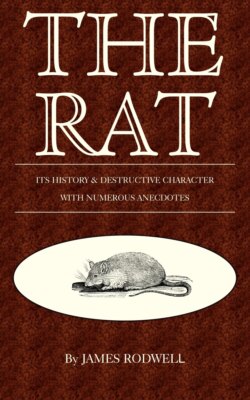Читать книгу The Rat; Its History & Destructive Character - James Rodwell - Страница 16
На сайте Литреса книга снята с продажи.
CHAPTER V. RATS’ NESTS, AND THE MATERIALS FOR BUILDING THEM.
ОглавлениеTHE female rats about the water-side, or in the fields, &c., select a secluded place where the male rats are not likely to find them, and there build their nests with soft dried grass, leaves, wool, or anything else that chance may throw in their way, and which may tend to make it soft and comfortable. Here they give birth to a naked blind family, which they watch and attend to with all the fondness of the most kind and affectionate of parents. But the rats about farmhouses and towns seem to spurn such simple rusticities; since, for the most part, their nests must be built with silken, linen, woollen, or cotton fabrics, and lined with paper, feathers, or furs. They are not very particular; for anything will suit them, from a lady’s cambric nightcap, silk stocking, Bloomers, Brussels lace, or sable tippet, down to the coarsest brown paper or dried monkey’s skin.
Among the furtive propensities of rats for obtaining their building materials, I give the following instances:—
A gentleman I knew, and his domestics were continually missing various small articles of both male and female wearing-apparel, such as socks or stockings from their bedsides, which they had pulled off only the night before, and also cambric collars, neckties, silk handkerchiefs, or napkins; in fact, any small article which was easy of conveyance. These continual losses of course led to numerous suspicions, which of necessity must have been the cause of many nights and days of uneasiness to the whole household; for, in a large miscellaneous business, where all articles of merchandise are constantly exposed, and where moneys are continually changing hands, what can be so cruelly harassing as to have clear and undeniable cause of suspicion that there is some dishonest person about the establishment. Then who could be the thief? there was the question! One thing was certain, that he who could find in his heart to steal a man’s silk handkerchief would feel few qualms of conscience in stealing his purse, if an opportunity offered. But, on the other hand, what could they want with a single sock or stocking, leaving the fellow one behind? There was the paradox. Yet, upon a more extended view of the matter, it was quite clear that the felonies were not perpetrated by any outdoor thieves; for, had they made an entrance at any time, they would not have taken such minor articles as silk handkerchiefs, odd socks, stockings, or napkins, when there were articles of far more serious value at hand. Besides there were no doors, shutters, or bolts displaced. No, no; the thieves were in the house; and thus things went on for months and months, and, in despite of every care and precaution, still things were continually missing, till their hopes of discovery fell into despair, and gave birth to the most reckless and perfect indifference.
Some time after the master of the house resolved upon having his store-room enlarged, in the corner of which there was a formidable copper, which was connected by means of a flue to a large projecting chimney-stack. All these he resolved upon having removed, as it would render the kitchen so much more roomy and convenient. The bricklayer was sent for, and scarce had he received his orders when he set to work to knock down the flue, and out tumbled eleven young rats, besides a host of old nests which, from time to time, had been built by the rats, till the flue was completely choked up. The copper had not been used for years; but when the bricklayer brought all the old nests to daylight, to the great joy of every one in the house, there were all the missing articles; and a strange motley group they presented. There were pieces of old stockings, old shirts and towels, sundry pieces of silk, flannel, cotton, and woollen cloth. Besides these, there were the remnants of various silk handkerchiefs, gloves, and a host of other things.
In a cellar, in Holborn, there existed a colony of rats, which, from being seldom molested, had eventually become so daring and bold that they even disputed the right of ownership with regard to the food that people might carry upon their persons. One day, the dried skin of a monkey, which had been suspended from a nail in the cellar, preparatory to its being stuffed and preserved, was suddenly missed, when, upon examining the premises, it was discovered behind some loose lumber, cut and torn into a hundred remnants, and fashioned into a commodious nest, in which were encradled five young rats. The infantine progeny were summarily destroyed; but the much-valued skin of the monkey had been rendered entirely useless by the mischievous and destructive parents.
A lady, residing at Malvern, had occasion to leave her home for a time; but on returning, after three months’ absence, she fancied her pianoforte sounded very curiously, and, on sending for a tuner, he discovered that a rat had gnawed a hole through the bottom, and taken up his residence in the interior, where he had built himself a commodious nest with the leather coverings of the hammers, with some portions of silk, and other articles of delicate composition, which he had foraged from the establishment.
